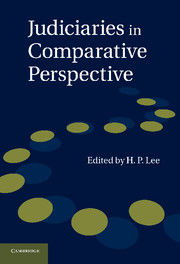Book contents
- Frontmatter
- Contents
- Contributors
- Foreword
- Preface
- Table of cases
- Table of statutes
- Part I
- Part II
- Part III
- Part IV
- 14 Judges, bias and recusal in Australia
- 15 Judges, bias and recusal in Canada
- 16 Judicial recusal in New Zealand
- 17 Judges, bias and recusal in South Africa
- 18 Judges, bias and recusal in the United Kingdom
- 19 Bias, the appearance of bias, and judicial disqualification in the United States
- Part V
- Part VI
- Index
- References
17 - Judges, bias and recusal in South Africa
from Part IV
Published online by Cambridge University Press: 07 September 2011
- Frontmatter
- Contents
- Contributors
- Foreword
- Preface
- Table of cases
- Table of statutes
- Part I
- Part II
- Part III
- Part IV
- 14 Judges, bias and recusal in Australia
- 15 Judges, bias and recusal in Canada
- 16 Judicial recusal in New Zealand
- 17 Judges, bias and recusal in South Africa
- 18 Judges, bias and recusal in the United Kingdom
- 19 Bias, the appearance of bias, and judicial disqualification in the United States
- Part V
- Part VI
- Index
- References
Summary
The South African Constitution confers extensive powers on the South African judiciary to uphold the rule of law. In so doing, it stipulates that courts must be independent and subject only to the Constitution and to the law, which judges must apply impartially and without fear, favour or prejudice.
Judicial impartiality is thus a principle at the forefront of the Constitution, but it was also deeply embedded in South African common law. Roman-Dutch law (derived substantially from Roman law) recognised the principle that no one should be a judge in his (or her) own cause and afforded a remedy, the exceptio recusationis, to enforce it. In the era of parliamentary sovereignty before the new democratic dispensation, the courts conferred perhaps the strongest protection they could on the common law requirement of judicial impartiality: they held that it could be excluded only by an express provision in an Act of Parliament. The Roman-Dutch law principle is substantially similar to the English common law principle of judicial impartiality and, accordingly, Commonwealth jurisprudence on judicial impartiality has been influential in South African courts.
- Type
- Chapter
- Information
- Judiciaries in Comparative Perspective , pp. 346 - 360Publisher: Cambridge University PressPrint publication year: 2011



